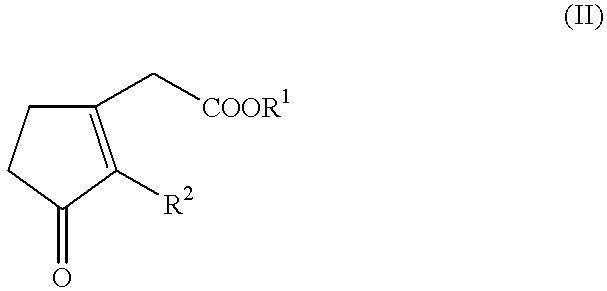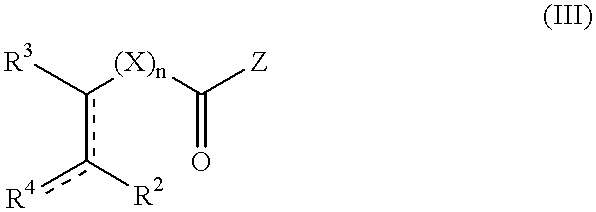Ruthenium catalysts and their use in the asymmetric hydrogenation of weakly coordinating substrates
a weakly coordinating substrate and ruthenium catalyst technology, applied in the field of ruthenium catalysts, can solve the problems of inefficiency when used
- Summary
- Abstract
- Description
- Claims
- Application Information
AI Technical Summary
Problems solved by technology
Method used
Image
Examples
example 1
Preparation of [Ru((R,R)-Me-DuPHOS)(H)(COT)](BF.sub.4)
In a glovebox, there were charged into a 50 ml flask 260.7 mg (0.816 mmole) of [(COD)Ru(methylallyl).sub.2 ] (origin: Acros Organics) and 10.8 ml of methylacetate. A separate 10 ml vial was charged with 250 mg (0.816 mmole) of (R,R)-(-)-Me-DuPHOS (origin: STREM Chemicals), 5 ml of CH.sub.2 Cl.sub.2 and 137 .mu.l of 81% HBF.sub.4.etherate (0.816 mmole of HBF.sub.4). The contents of this 10 ml vial were then poured into the stirred mixture contained in the 50 ml flask and this mixture was further stirred during 12 hours. A yellow precipitate was collected by filtration (180 mg, 0.299 mmole, yield: 37%), consisting of [Ru((R,R)-Me-DuPHOS)(H)(COT)].sup.+ BF.sub.4.sup.- which was extensively analyzed by spectroscopy. The structure of this crystalline product was unambiguously established by spectroscopic analysis. The data obtained were the following (.sup.1 H and .sup.13 C NMR established relative to trimethylsilane ; CI=Chemical Ion...
example 2
Hydrogenation of methyl 3-oxo-2-pentyl-1-cyclopentene-1-acetate
In a glovebox, into a 10 ml glass vial were placed 15.5 mg (0.0485 mmole) of [(COD)Ru(methylallyl).sub.2 ], 14.9 mg (0.0485 mmole) of (R,R)-Me-DuPHOS and 250 .mu.l of methyl 3-oxo-2-pentyl-1-cyclopentene-1-acetate (1.08 mmole). To this suspension was added 0.630 ml of a 0.081 M solution of titrated HBF.sub.4.etherate (0.049 mmole) in CH.sub.2 Cl.sub.2 with stirring. This concentrated solution was stirred for 1.5 hours, after which 21.5 g (95.9 mmole) of methyl 3-oxo-2-pentyl-1-cyclopentene-1-acetate and 11.5 ml of CH.sub.2 Cl.sub.2 were added. The resulting yellow solution was placed in a 75 ml autoclave, purged with hydrogen and pressurized to 90 bar of hydrogen. After 8 hours, the solution was exposed to air and passed through a column of silica gel to separate the catalyst. This gave a 99% yield of the desired Hedione.RTM. product with the following ratios of isomers: cis / trans=98 / 2; (+)-cis / (-)-cis=82.4 / 17.6, 64.8% e...
example 3
Hydrogenation of methyl 3-oxo-2-pentyl-1-cyclopentene-1-acetate Using the Catalyst Described in Example 1
In a glovebox, into a 10 ml glass vial were placed 15.0 mg (0.0250 mmole) of [((R,R)-Me-Duphos)Ru(H)(cyclooctatriene)]BF.sub.4, 5.62 ml of CH.sub.2 Cl.sub.2 and 11.23 g (50.0 mmole) of methyl 3-oxo-2-pentyl-1-cyclopentene-1-acetate. The resulting yellow solution was placed in a 75 ml autoclave, purged with hydrogen and pressurized to 90 bar of hydrogen. After 6 hours, the solution was exposed to air and passed through a column of silica gel to separate the catalyst. This gave a 99% yield of the desired Hedione.RTM. product with the following ratios of isomers: cis / trans=98 / 2; (+)-cis / (-)-cis=82.3 / 17.7, 64.6% ee.
Using in the above-described process 7.5 mg of catalyst (0.0125 mmole) provided a final product with the same characteristics as above, in 98% yield, after 33 h of reaction.
PUM
| Property | Measurement | Unit |
|---|---|---|
| Fraction | aaaaa | aaaaa |
Abstract
Description
Claims
Application Information
 Login to View More
Login to View More - R&D
- Intellectual Property
- Life Sciences
- Materials
- Tech Scout
- Unparalleled Data Quality
- Higher Quality Content
- 60% Fewer Hallucinations
Browse by: Latest US Patents, China's latest patents, Technical Efficacy Thesaurus, Application Domain, Technology Topic, Popular Technical Reports.
© 2025 PatSnap. All rights reserved.Legal|Privacy policy|Modern Slavery Act Transparency Statement|Sitemap|About US| Contact US: help@patsnap.com



